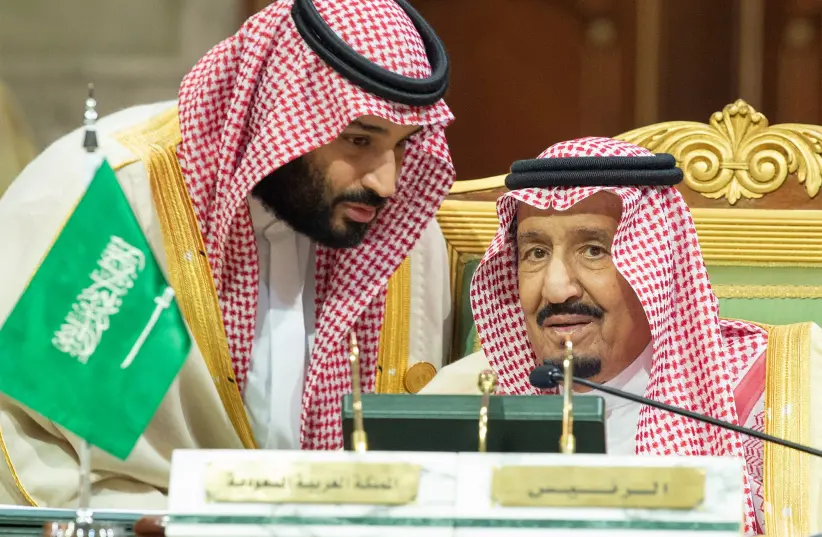Israeli officials are concerned that increased pressure on the Saudis, will weaken the regional alliance against Iran.
The Biden administration’s report on the killing of Jamal Khashoggi, released on Friday, is as notable for what is not in it as it is for what is.
“We assess that Saudi Arabia’s Crown Prince Muhammad bin Salman approved an operation in Istanbul, Turkey, to capture or kill Saudi journalist Jamal Khashoggi,” the four-page report begins.
Aside from a list of names of people involved, on whom the US imposed sanctions, the contents of the report can be easily summarized in two sentences.
The people known to be involved in killing Khashoggi all belong to organizations with close ties to MBS, as the Saudi prince is known, and are unlikely to have taken such extreme action without his imprimatur. In addition, the prince has clamped down on dissidents since taking control of Saudi’s security and intelligence apparatuses in 2017, and viewed Khashoggi as a threat.
This is information that has been easily available to the public for the past two years, and anyone who has been paying attention didn’t need a report from the Director of National Intelligence (DNI) to know it. Which begs the question: Why was this sparse report declassified now?
US President Joe Biden already made his intentions toward the Saudis clear during his election campaign. Focusing on the Khashoggi killing in particular, as well as their part in the civil war in Yemen, he highlighted the kingdom’s human rights violations – which are myriad and reprehensible, it must be said.
Of course, sadly, there are unconscionable violations of human rights by regimes across the Middle East and around the world, but Saudi Arabia seemed to be the target of great opprobrium from Biden.
This could very well be because of how close the Trump administration was with the Saudis, and MBS in particular, even when it became apparent that the prince was personally responsible for many of those abuses.
THE FOCUS on Saudi abuses, as opposed to those of the violent theocratic regime on the other side of the Gulf – the Islamic Republic of Iran – is a symptom of another reversal from Trump administration policy: that Biden seeks to rejoin the 2015 nuclear deal with Iran.
Saudi Arabia and Iran have, of course, long been rivals seeking hegemony, or at least leadership, in the region. Saudi and Iranian proxies have faced off in Yemen, and Iran has been behind attacks on Saudi oil fields, among others.
The Biden administration is apparently still on the side of the Saudis, but it’s taking a very large, public step back. “The aim is a recalibration [ties] – not a rupture,” a senior official told Reuters on Friday. “That’s because of the important interests that we do share.”
The light-on-details DNI report released this weekend is a bit of performative justification of that recalibration, the details of which the US is expected to announce in the coming days. They’ve already started with the sanctions on officials, which stopped short of imposing them on MBS.
Israel is watching warily. Saudi-Israel ties have grown closer in recent years, so much so that Prime Minister Benjamin Netanyahu secretly met with MBS in Saudi Arabia in November.
Those relations, like Israel’s now-official ties with the United Arab Emirates and Bahrain, deepened despite the regional taboo against associations with the Jewish state, because of the countries’ shared concerns about the Iranian threat – nuclear and otherwise – and Jerusalem’s willingness to take a stand against Tehran.
Yet the relations never came to fruition because, even though both Saudi Arabia and the UAE have a crown prince looking towards modernization and greater openness, the kingdom still has King Salman above MBS, and the king retains the more traditional Arab view toward Israel.
Still, KAN reported this week that Israeli and Saudi officials have spoken on the phone several times in recent weeks to discuss the Biden administration’s moves towards returning to the Iran deal and its increased focus on human rights violations by Saudi Arabia.
ISRAELI OFFICIALS are concerned that increased pressure on the Saudis, as well as Egypt, will weaken the regional alliance against Iran at a time when the US is showing less willingness to confront the regime of the ayatollahs. Another concern is that Riyadh will be discouraged from strengthening or even maintaining their ties with Jerusalem if they don’t help them in Washington.
There is, however, another possibility. It was during the Obama administration, which was truly soft on Iran, that Israel’s ties with Gulf states intensified, bringing them together to protect themselves against a Tehran whose malign behavior was not constrained and whose nuclear project was only postponed by the 2015 agreement, not prevented.
To be fair, the Biden administration says it won’t lift sanctions until Iran returns to compliance with the nuclear deal’s enrichment limitations, and that it wants to push for a stricter deal that will address the problems with the old one, which Israel pointed out back then and have come true in the ensuing years.
Time will tell if that comes to be – though the lifting of restrictions on Iranian diplomats to the UN and the possible release of Iranian funds from South Korean banks don’t send a particularly encouraging message to US allies in the Middle East.
As such, the Saudis and Israelis may continue to be thrown together by a common enemy in Iran – though that would be a small comfort compared to the letdown if Israel’s greatest ally, the US, chooses to appease the ayatollahs who seek the Jewish state’s destruction.
 Eurasia Press & News
Eurasia Press & News


